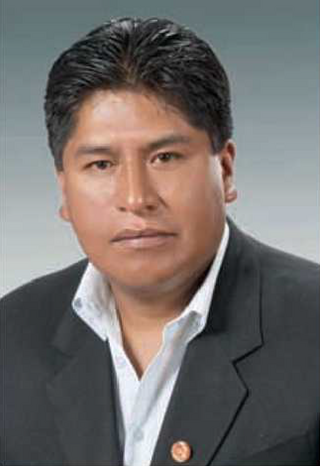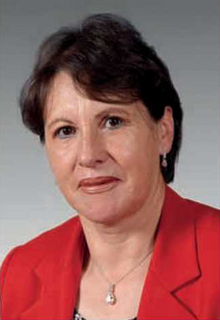
Severo Aguilar Gabriel is a Bolivian politician and trade unionist who served as a member of the Chamber of Deputies from Potosí, representing circumscription 41 from 2010 to 2015. A member of the Movement for Socialism, he previously served as a member of the Constituent Assembly from Potosí, representing the same circumscription from 2006 to 2007.

Ángel David Cortés Villegas was a Bolivian educator, politician, and trade unionist who served as a member of the Chamber of Deputies from Potosí, representing circumscription 37 from 2010 to 2015.

Luis Gallego Condori is a Bolivian lawyer and politician who served as a member of the Chamber of Deputies from Potosí, representing circumscription 39 from 2010 to 2015.

Miriam Marcela Revollo Quiroga is a Bolivian academic, politician, and sociologist who served as a member of the Chamber of Deputies from La Paz, representing circumscription 10 from 2010 to 2015. Though Revollo's political career is closely linked to that of her husband, longtime La Paz Mayor Juan del Granado, her political origins are independent of marriage. A graduate of the higher universities of San Simón and San Andrés, Revollo entered political life as an activist in the student movement and was a steadfast advocate for the inclusion of women in the country's democratic process. Together with her husband, she founded the Fearless Movement, with which she was elected as a party-list member of the Constituent Assembly from La Paz from 2006 to 2007. As a parliamentarian, she continued to work toward the advancement of women's causes, largely supporting the social policies enacted by the ruling Movement for Socialism, even as she simultaneously criticized many of the administration's illiberal practices.

Jaime Medrano Veizaga is a Bolivian mineworker and politician who served as a member of the Chamber of Deputies from Oruro, representing circumscription 36 from 2010 to 2015. Born to a mining family from Catavi, Medrano spent much of his life in Huanuni, site of one of the largest tin mines in the country. He spent much of his career as a company worker for the Huanuni Mining Corporation, serving as a sectional leader and as the mine's industrial safety inspector. In the alliance between the mining sector and the Movement for Socialism, Medrano broadly represented all of Huanuni's mineworkers in the Legislative Assembly, though he was primarily affiliated with the area's minority salaried company workers, noted for their frequent conflicts with the much larger group of cooperative workers over control of the most productive repositories.

Roberto Rojas Herrera was a Bolivian accountant, politician, and trade unionist who served as a member of the Chamber of Deputies from La Paz, representing circumscription 15 from 2010 to 2015. A member of the Movement for Socialism, Rojas entered political activity as a member of El Alto's neighborhood councils, serving as secretary of sports for the city's San Pablo Zone before presiding over the District 3 council from 2000 to 2009. One rung above, he served as secretary of organization of the Federation of Neighborhood Councils from 2008 to 2010. The organization's alliance with the Movement for Socialism facilitated Rojas' entry into the Chamber of Deputies. Following his tenure in the legislature, he returned to El Alto, briefly serving as regional manager of the state-owned water and sanitation company before finally retiring from public life.

Farides Vaca Suárez is a Bolivian librarian and politician who served as a member of the Chamber of Deputies from Beni, representing circumscription 62 from 2010 to 2015.

Felipe Molloja Báez is a Bolivian politician and trade unionist who served as a party-list member of the Chamber of Deputies from Potosí from 2010 to 2015. Raised in rural poverty, Molloja developed his career within the Omiste Province's trade union structure, holding leadership roles in various local, provincial, and regional agrarian and peasant syndicates. In 1999, he joined the ranks of the newly founded Fearless Movement, with whom he competed for the Villazón mayoralty in 2004, taking second place and attaining a seat on the municipal council. For the 2009 general elections, as part of his party's alliance with the Movement for Socialism, Molloja was elected to represent Potosí in the Chamber of Deputies. Within months of taking office, the Fearless Movement split with the ruling party, with Molloja joining his compatriots in forming a small breakaway caucus in the lower chamber.

Carmen Leonor Rodríguez Bolaños is a Bolivian economist, politician, and trade unionist who served as a party-list member of the Chamber of Deputies from La Paz from 2010 to 2015.

Emeliana Aiza Parada is a Bolivian politician and trade unionist who served as a party-list member of the Chamber of Deputies from Potosí from 2010 to 2015. A member of the Movement for Socialism, she represented the same department as a substitute alongside Severo Pacaja from 2006 to 2010.

René Vidal León was a Bolivian politician and trade unionist who served as a party-list member of the Chamber of Deputies from Chuquisaca from 2010 until his death in 2012. He previously served on the Sucre Municipal Council from 2000 to 2004.

Osvaldo Guillermo Torrez Arisaca is a Bolivian community organizer and politician who served as a member of the Chamber of Deputies from La Paz, representing circumscription 11 from 2010 to 2015.

Julia Figueredo Paniagua is a Bolivian agricultural worker, politician, and trade unionist who served as a party-list member of the Chamber of Deputies from La Paz from 2010 to 2015.

Patricia Mancilla Martínez is a Bolivian politician and trade unionist who served as a party-list member of the Chamber of Deputies from La Paz from 2010 to 2015. A member of the Movement for Socialism, she previously served on the Cairoma Municipal Council from 2000 to 2005.

Ninfa Huarachi Condori is a Bolivian politician and trade unionist who served as a party-list member of the Chamber of Deputies from Tarija from 2010 to 2015.

Donato Rubén Callisaya Mayta is a Bolivian politician and trade unionist who served as a party-list member of the Chamber of Deputies from La Paz from 2010 to 2015.

Nelly Núñez Zegarra was a Bolivian nurse and politician who served as a member of the Chamber of Deputies from Oruro, representing circumscription 32 from 2010 to 2015.

Carlos Eduardo Subirana Gianella is a Bolivian lawyer and politician who served as a member of the Chamber of Deputies from Santa Cruz, representing circumscription 50 from 2010 to 2015.

Jorge Adalberto Choquetarqui Jahuircata is a Bolivian community organizer and politician who served as a party-list member of the Chamber of Deputies from La Paz from 2010 to 2015.

Rodolfo Calle Inca is a Bolivian small businessman, lawyer, and politician who served as a party-list member of the Chamber of Deputies from La Paz from 2010 to 2015.





















